- Home
- Liz Braswell
Once Upon a Dream
Once Upon a Dream Read online
Copyright © 2016 Disney Enterprises, Inc.
Cover design by Scott Piehl and SJI Associates, Inc.
Cover illustration by Mike Heath
All rights reserved. Published by Disney Press, an imprint of Disney Book Group. No part of this book may be reproduced or transmitted in any form or by any means, electronic or mechanical, including photocopying, recording, or by any information storage and retrieval system, without written permission from the publisher. For information address Disney Press, 1101 Flower Street, Glendale, California 91201.
ISBN 978-1-4847-0765-4
Visit disneybooks.com
Contents
Title Page
Copyright
Dedication
Epigraph
Consider the Dragon
Happily Ever After, Redacted
Status Quo
“Douce Dame Jolie”
In the Cards
The Ball
We’re All Mad Here
The Bluebird of Happiness
Dancing While the World Burns
Interlude
The Inevitable Forest Primeval
Enter the Prince
Once Upon a Time as It Really Was (as Told by the Prince)
The Denouement
Meanwhile, Back at the Castle…
Feeling Ravinous
You’re So Vain
Sing to Me, O Muse
To Sleep, Perchance to Dream
Awakening. Sort Of.
Interlude
They Hadn’t the Foggiest
Double the Fun
Interlude
Void
Interlude
O Fool, I Shall Go Mad!
Childhood Haunts
The Really Long Journey Back to the Castle
Interlude
Her Return
Another Denouement
Consider the Dragon. Again.
The End.
The End?
Happily Ever After
Epilogue: All Good Things
About the Author
For my daughter, Ivy. Wake up, grab your sword, defeat the twin dragons of doubt and uncertainty, conquer the world. I will always love you.
Also, stop drinking my coffee.
—L.B.
Once upon a time I was in an endless dark forest. No—actually endless, I tell you! In another world! I wandered for ages all by myself in the woods. My wife died years ago, you see. I don’t know where my oldest boy was. My little girls and lads were safe at home, I think.
Once upon a time, we were all together, in a castle, you know, but things change. Wives die and eldest sons grow up and chase after princesses and peasant girls, riding away from you forever….
—King Hubert
A DRAGON WAS DEAD.
A giant black and purple fire-breathing dragon from the very pits of hell itself was dead somewhere outside the castle. Thorns were falling from the battlements like rain, making curiously pleasant wooden sounds on the grounds of the bailey. Many strange and dire things were happening to an ancient keep that had already endured enough unusual treatment for the past sixteen years.
The handsome prince had killed the dragon with the help of the three strange little fairies he now followed. Without them, he would have done no good whatsoever.
Without them, he would never have been able to hurl the sword magically into the one spot that would easily kill the beast. Without them, he wouldn’t have had the enchanted sword in the first place. Without them, he would have still been rotting in the evil fairy’s dungeon, waiting impatiently for a hundred years to pass so he could break his true love’s spell—as a doddering old man.
Still, the dragon nagged at the back of his mind like a mosquito. A slain dragon should be something. There should be a pause, an astounded moment of silence, when he and the fairies and anyone else watching would take a breath and acknowledge the incredible deed that was just accomplished. He had no illusions that it was all due to him; still, he was a prince, it was a dragon, the dragon was dead—shouldn’t there be an intermission? Something?
And also. There were some unresolved details about the dragon and its death. The fire, for instance—it looked like the dragon had set most of the forest alight. Was it still raging? Would it ignite the woody thorns that surrounded the castle and the village? Was the whole place just one giant bonfire waiting to explode?
Was there, in fact, any dragon body left at all, or had it turned back into Maleficent?
Had he been battling a dragon that had temporarily been in fairy form, or had the fairy transformed herself into the beast?
Was it really from hell? Or was that more hyperbole on the fairy’s part?
And yet still he climbed steps in the silent, drowsing castle. The girl who was destined to sleep a hundred years had only been unconscious for a few hours, along with the rest of her kingdom. Already the inside air had that cool, musty smell usually associated with the bedrooms of those who didn’t move much: very great-grandmothers, for instance.
The fairies’ wings fanned up tiny tornados of encroaching dust.
The dragon faded in his mind as he fought off the strange presence of magical sleep, the good fairies’ spell affecting even those it wasn’t meant for. Murky, dim halls only added to his feeling of swimming through the castle while kicking his legs toward the sun.
For that is what he attained in defeating the dragon: the girl—sunlight herself.
He first saw her in a ray of sunshine. She was dancing and singing in a forest clearing, her golden hair sparkling as it swirled around her. Her voice was the very essence of a happy, sunny day distilled into song. She was as weightless on her toes as golden motes in a drowsy beam, floating their way up to the ceiling.
Very soon now he would kiss the girl, break the spell, wake the girl—wake everyone—and they would marry, and there would be happily-ever-afters for all.
Or something. The fairies weren’t exactly explicit when they had come out of nowhere, freed him, helped him kill the dragon, and led him to this set of stairs that they were presently climbing.
Somehow his girl from the clearing was mixed up with fairies and witches and dragons and castles—this familiar castle, where he had been taken as a child to see the drooling baby he would someday marry. It turned out the forest girl was the princess—not that it mattered to the prince; he was willing to upend convention and marry a peasant for love.
This was, however, a lot more convenient for everybody.
As he entered her bedroom, these thoughts were discarded to the same mental pile of ashes where the dragon lay.
For there was his sleeping beauty—no peasant girl she. Now she wore the proper attire of the princess he must have somehow always known she was. A blue gown as pure as the sky, white wings of cloth above her shoulders like an angel’s. Lips closed but not tight, dreamless, without the tension of any emotion.
Phillip paused, overcome by her beauty.
Did a fairy make a noise? Did he feel some external force pushing him to hurry up with it? The dragon was dead, there were a million explanations waiting, there was a sleeping girl before him dying to wake up.
He knelt, pressing his own lips ever so softly to hers.
Immediately, his knees crumpled.
He fell, his head hitting the soft quilts and satin bolsters on her bed.
His last thought, before sleep and someone else’s dreams overcame him:
That damn dragon.
Did anyone make sure it was actually dead?
ONCE UPON A TIME there lived a king and queen who ruled their kingdom as their forefathers had—but with even less wisdom. They hunted unicorns in the deep forests until there were none left. They banished all of the wise old m
en and women, witches and hermits, priestesses and shamans, who advised them to follow a more prudent path. They threw parties for neighboring kings and queens that fairly bankrupted the castle—which led them to levy even higher taxes on the poor. Then they looked around at those neighbors’ lands with covetous eyes, wishing they had more for themselves. But as it was mostly a peaceable country, they had no military recourse.
After some years the queen gave birth to a girl, which was something of a disappointment since they wanted a prince who would inherit the kingdom and become king one day. At least she was beautiful and sweet-tempered, with a halo of golden hair that made her look like a cherub. Everyone who saw the baby princess fell in love with her.
For the baby Aurora’s naming ceremony the king and queen invited everyone they knew, as well as three evil fairies who lived in the darker parts of the land. Every guest dined on rich delicacies kept warm under golden domes and they ate with golden forks and golden knives. Every banqueter was allowed to keep their golden dinnerware as well as the jeweled goblets that held ancient, priceless wine.
And all the guests gave gifts to the beautiful little baby: snow-white ponies, pillows of velvet and silk, toys carved by the cleverest dwarves.
And then it was the three evil fairies’ turn.
“Here she is, as promised,” said the king.
“Now it’s time for your gifts,” said the queen.
The first fairy laughed wickedly. “Hmmm. How about beauty? She may as well be pleasant to look upon while she slaves for us eternally.”
The second fairy said, “I’ll give her the gift of song and dance. Perhaps she can entertain us.”
The third fairy said, “I give her parents the power they wish and supernatural help they need to attain their hearts’ desire. And on her sixteenth birthday, we will claim the princess as ours.”
The three wicked fairies laughed and tittered in unsettling peals.
“No!”
Hidden among the guests was one of the last remaining good fairies in the kingdom, who had kept a low profile since the banishments began.
“My lord and lady,” Maleficent said, coming forward. She was an impressive figure, young and comely. “You cannot do this. You cannot sell your child to the likes of these.”
“I thought we had done with the last of you,” the king growled. “Do not meddle in the affairs of kings, hag. It is not your place.”
Maleficent looked sadly down at the helpless little baby, who was still smiling despite what was going on around her.
“Poor child,” she murmured. “My powers are not strong enough to prevent this wicked transaction. Not the way matters stand now. But I swear on my own life I will be back and set everything to rights. On your sixteenth birthday, goodness and nobility will be restored to this wretched kingdom.”
And she vanished in a puff of green smoke.
As the days wore on in the wretched kingdom, the little princess Aurora grew in grace and beauty. She sang and danced to the delight of everyone around her.
Her parents, meanwhile, made good use of the powerful demons and fearsome magics given to them by the fairies. They waged strange and terrible wars upon their neighbors that not only decimated their enemies but punished the land itself, rendering it infertile and foul. Only horrible black and twisted things grew where the king and queen’s army had passed.
Soon that was most of the known world.
The peaceful valleys, lush orchards, sparkling rivers, and snow-capped mountains that the queen and king had so envied and wanted for themselves were now nothing more than a blasted wasteland blown through by hot and deadly winds, occupied by only the most vile, unnatural creatures born of darkness and magic.
And the monsters, having consumed everything else, began turning their hideous eyes to their masters’ castle.
Meanwhile, the good little princess was mostly neglected by her parents and often wore rags—except for the rare occasion when the king and queen noticed her and decided to dress her like a proper member of royalty, so all who remained could see and admire her.
Aurora took her mistreatment surprisingly well, making friends with the dwindling number of cats, mice, dogs, birds, and squirrels who lived within the castle walls. All the people who still made the castle their home loved her utterly.
But they were frightened of her parents more.
At sixteen years of age, Aurora, now a beautiful young woman, knew full well that her birthday celebrations were less important than the apocalyptic events that were occurring in the world around her. She forgave her parents in advance for most likely forgetting that special day—as they had for the last fifteen.
Still, she dressed in her finest gown and prepared to greet everyone with the grace and good humor for which she was known. Someone would remember and wish her congratulations, perhaps whispered so her parents wouldn’t hear.
As the clock struck noon in the middle of her birthday, the three evil fairies appeared.
“We have come for what we have been promised,” the first one said.
“We can no longer control the magics you gave us!” the king protested.
“Perhaps you shouldn’t make deals with the devil,” the second fairy said.
“You must save us!” the queen cried.
“No,” the third fairy said. “Now hand her over.”
Confused, Aurora looked from her parents to the fairies.
“What…what is meant by all of this?” she asked, hoping against hope she didn’t understand.
“You must go,” the queen said wearily, gesturing to the fairies.
“NO.”
As had happened sixteen years previously, there was a puff of green smoke. Maleficent appeared. She did not look like she had before; now she leaned hard on a staff, and her beautiful face was drawn and hollow. Black robes wrapped around her like she was an ancient pilgrim at the end of a very long journey.
“It has taken me the full sixteen years to prepare, but now I shall do my best to prevent further evil in this kingdom,” she said, her voice still strong. She raised her staff and green light glowed from the crystalline orb at its top.
“You have no power—” the first fairy began.
“BEGONE!” Maleficent cried. She threw both her hands into the air and green fire shot from her body.
The three fairies shrieked and dissolved backward, the essence of their being returned to whatever evil place had spawned them.
“Oh, foolish king and queen,” Maleficent said. “What evil you have done cannot be entirely undone. The land will shriek forever from the pain you have caused it. Perhaps, however, I can save what little is left.”
She raised her arms again and chanted. Green fog flowed out from her fingertips and through the delicately paned windows of the castle. It ebbed around the black and twisted trees that now grew in the dried-up moat. Vines and thorns began to sprout from the ground. These grew rapidly and reached up over the castle walls, crisscrossing quickly like the warp and weft of a spinster’s loom. Soon the whole castle was enveloped in a dark green shadow.
Unholy cries of frustration rang out from the blasted land beyond.
Spent, Maleficent fell back, her white face even paler than before.
“We are safe.”
The king, about to give her royal thanks or some such, was not allowed to speak.
She held up her hand and he was silenced.
“You, however, will receive a punishment far kinder than you deserve considering the things you have done,” she said coldly. “For selling your own daughter to the Dark and destroying the world outside these castle walls, you should die. But as the new queen of this castle, I will show leniency and lock you in the dungeon forever, where you may think upon what you have done and repent.”
And the guards of the castle, and the people within, did nothing to stop this—and may, in fact, have helped push their old king and queen down the stairs.
“Sold me?” Aurora murmured. “I don’t unders
tand….”
Maleficent put her hand on the poor girl’s head.
“I am so sorry, child,” she said. “This is a terrible thing to have happened to you and the world you knew. But at least now you and those still here may live, and we shall survive and prevail.”
And so Queen Maleficent, Aurora, and the survivors in the castle lived happily ever after, while the world lay dead and deadly around them.
THE PRINCESS AURORA was spinning again.
She couldn’t help it.
When the corridors were wide, inviting, and empty…When bright bands of actual sunlight slipped through the vines and the windows, golden and slow, puddling on the ground the way she imagined it did in real forests…When the soft carpet beckoned, patterned with dark colors and bright spots the way meadows were supposed to be…Then she would sing and spin, twirling down the corridor, feeling the warm moments of light on her skin as she flung her arms out. Trying to recapture snippets of dreams that once in a while involved the woods.
Sometimes she took off her golden shoes.
She would sing whatever came to mind and seemed appropriate for the moment—bits from the nicer tunes the minstrel taught her, proper ballads from her music tutor, half-remembered lullabies, snippets of her own invention. Sometimes, right before sleep claimed her, music rang in her sleepy ears, entire orchestras and choruses proclaiming sternly but joyfully some unremembered thing. Sometimes she would try to remember those tunes, and sing them, too.
This was usually a good corridor for twirling. It was on the southern side of the castle, just above the great hall, and if the hot winds outside managed to scrape away the layers of smoke and soot, sunbeams would sometimes form. The far end of the corridor led to a wide set of formal stone stairs that had balustrades good for dragging the tips of her fingers dramatically along while pushing herself back and forth to each side, like a deer happily tumbling down a waterfall.
Or maybe it was fish who did that. She couldn’t keep them straight.
At the bottom, she tried to cross and uncross her feet quickly the way she had seen some of the troubadours and girl performers do. Her golden hair fell like a ripple of costly fabric, first down one shoulder and then the other, as she quickly shifted position. She lifted the hem of her dress so she could watch her feet and make sure they were doing what they were supposed to. But it was all so utterly graceful that anyone watching would have thought it was part of the performance.

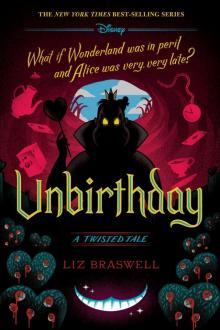 Unbirthday
Unbirthday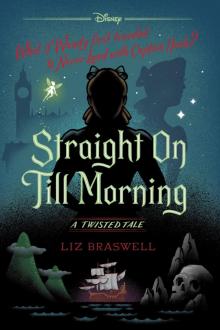 Straight On Till Morning
Straight On Till Morning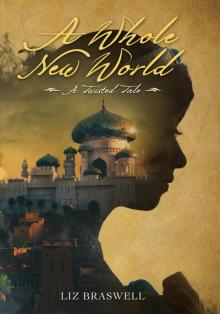 A Whole New World
A Whole New World Once Upon a Dream
Once Upon a Dream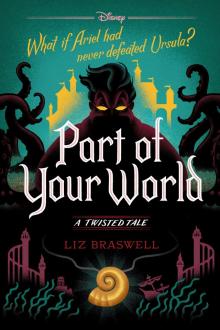 Part of Your World
Part of Your World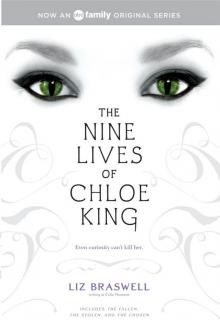 Nine Lives of Chloe King
Nine Lives of Chloe King The Fallen
The Fallen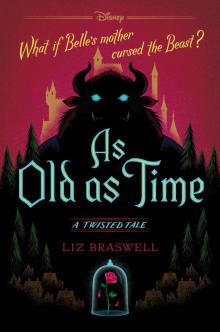 As Old As Time: A Twisted Tale (Twisted Tale, A)
As Old As Time: A Twisted Tale (Twisted Tale, A)